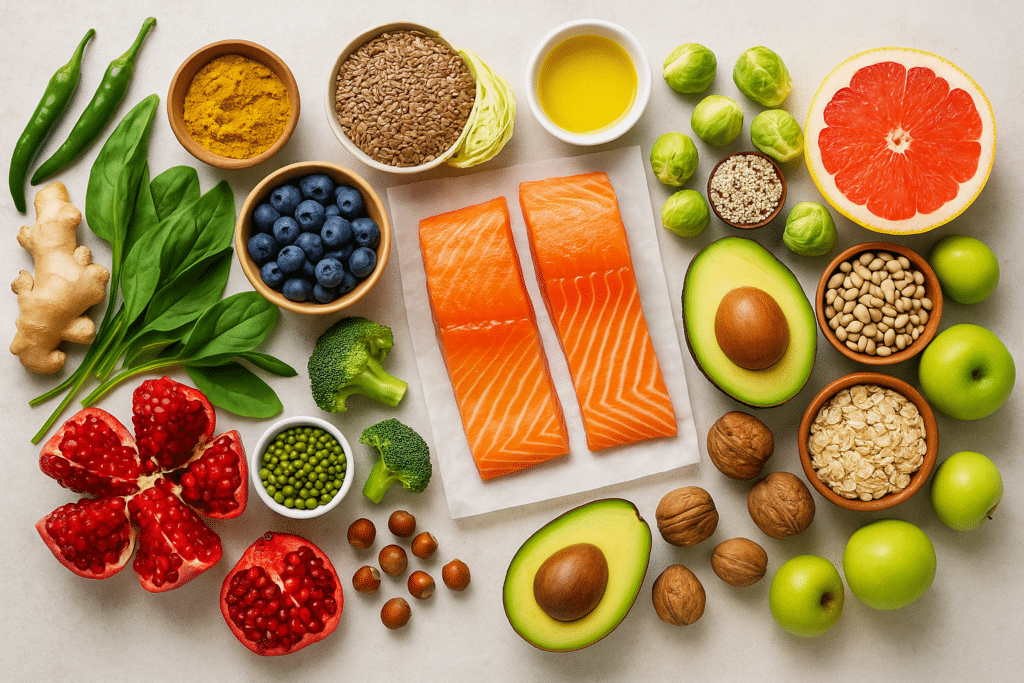Solved! Foods to Avoid if You Have Neuropathy

Table of Contents
If you live with neuropathy, you know the constant tingling, pain, and numbness can make daily life a struggle. But simple changes to your diet could help provide relief. The right foods can calm and soothe oversensitive nerves. However, the wrong foods may intensify inflammation and neuropathic symptoms.
In this guide, we’ll cover specific food choices to avoid, better alternatives, and small dietary changes that can have a meaningful impact on managing your discomfort. Equipped with this knowledge, you can take control and use nutrition to minimize neuropathy symptoms.
Key Takeaways
- Avoidance is Key: Individuals with neuropathy should be wary of highly processed foods, added sugars, dairy, gluten, and excessive alcohol. These can exacerbate neuropathy symptoms by inducing inflammation and spiking blood sugar levels.
- Lean Proteins: Prioritize the inclusion of fish and poultry, which serve as excellent protein sources that are beneficial for neuropathy management.
- Dietary Staples: Emphasize whole grains, a variety of fruits and vegetables, and healthy fats in your diet ensures a holistic approach to neuropathy care.
Understanding Neuropathy and its Effects on Diet
Neuropathy refers to conditions stemming from nerve damage. This damage often translates to symptoms like numbness, pain, and weakness in different body parts. Various triggers stem from vitamin B-12 deficiencies to exposure to toxins like mercury which can instigate this condition. It’s worth noting that those with diabetes face a heightened risk of diabetic neuropathy.
While completely curing peripheral neuropathy remains a challenge, its advancement can be mitigated through strategic steps, such as dietary modifications and minimizing exposure to toxins.
“As a clinician, I’ve seen the profound impact of diet on neuropathy symptoms firsthand,” explains Dr. Zach Bruley, chiropractor and certified nutritionist. “What patients eat can truly help or hinder their nerve health.”
How Neuropathy Affects Your Diet
A healthy and balanced diet is key to improving neuropathy symptoms. Certain foods have the potential to amplify peripheral nerve damage which further intensifies the associated discomfort. Foods loaded with added sugars or those that undergo excessive processing can escalate neuropathic pain by inducing inflammation and elevating blood sugar levels.

Foods to Avoid with Neuropathy
Overly Processed Foods
When addressing neuropathy, it’s important to research your dietary selections. Highly processed foods like potato chips, cold cuts, and numerous fast food delicacies, are high in sodium. They also often have added sugars which increase neuropathic discomfort.
Common choices, such as pizzas and hamburgers, are filled with saturated fats and preservatives. Each of these pose potential risks for exacerbating nerve related issues. Be sure to choose foods with fewer additives, low sugar, and salt content.
Added Sugars
Sugary delights such as candy, cookies and ice cream are tempting but come with a price. Beyond contributing to weight and inflammation, they can intensify nerve damage and pain. Even refined grains can be turned into sugar once ingested. Make sure to scrutinize food labels diligently and veer towards whole grain alternatives. By doing away with foods rich in added sugars, neuropathy symptoms can be managed more efficiently.
Dairy Products
While dairy is a dietary mainstay for many, it can be a stealthy antagonist for neuropathy sufferers. Products rich in saturated fats, like cheese and butter, can fuel inflammation, escalating neuropathy discomfort. Neuropathy patients should consider moderating or even sidestepping dairy to better control their symptoms.
Gluten
Gluten is found in grains such as wheat, barley, and rye, and it can intensify peripheral neuropathy. Those suffering from celiac disease or gluten sensitivities are particularly vulnerable. A stringent gluten free regimen can alleviate gluten induced neuropathy pain. This entails abstaining from foods crafted from wheat, barley, or rye, like certain breads and cereals.
Excessive Alcohol Consumption
For many, moderate alcohol consumption poses little concern. Yet, chronic excessive intake can usher in alcoholic neuropathy which can lead to nerve deterioration. It can especially impact the autonomic nerves overseeing bodily functions. Additionally, the nutritional voids stemming from alcohol can further nerve damage.
Neuropathy patients should be aware of alcohol’s ramifications and contemplate minimizing or forgoing its consumption for optimal symptom management.
Why These Foods Are Problematic
The foods that tend to worsen neuropathy have one thing in common – they promote inflammation. As Dr. Evan Norum explains, “Foods like processed carbs, sugary snacks, and fatty red meats are inflammatory and can exacerbate neuropathy symptoms.”
Inflammatory foods put extra stress on the damaged nerves which heightens pain and irritation. Specific foods to limit or avoid include gluten, excessive alcohol, added sugars, refined grains, unhealthy fats, and heavily processed items. Even healthy foods could contain hidden compounds that worsen neuropathy.
The key is focusing on fresh, whole foods that fight inflammation. A balanced diet rich in fruits, vegetables, lean proteins, and healthy fats can help manage neuropathy discomfort. Small, consistent changes to minimize inflammatory foods and emphasize nutritious anti-inflammatory foods can substantially improve neuropathy symptoms over time.

Better Food Options for Neuropathy
Lean Protein Sources
Fish and poultry stand out as prime sources of lean protein, boasting a rich content of vitamin B12 – a vital nutrient for the health of blood cells and nerves. Integrating these lean proteins into your diet not only fortifies your overall health but also offers a robust defense against neuropathy symptoms. Beyond their nutritional prowess, fish and poultry introduce a delightful variety to a neuropathy conscious meal plan.
Whole Grains
Whole grains are indispensable to a neuropathy friendly regimen. Unlike their refined counterparts, whole grains preserve the entirety of the grain: the bran, germ, and endosperm. This ensures a bounty of fiber, vitamins, minerals, and antioxidants that champion overall health. By weaving whole grains into your culinary tapestry, you bolster your digestive health and diminish neuropathy risks. Furthermore, whole grains are stalwarts in cardiovascular health, adept at slashing cholesterol and curbing inflammation
Fruits and Vegetables
Prioritizing a diet rich in fruits and vegetables is paramount for handling neuropathy pain. These nutrient dense foods teem with essential vitamins, minerals, and antioxidants, fortifying nerve health. Notably, fruits like blueberries have earned accolades for their potential in nerve damage mitigation. A palette of diverse, vibrant fruits and vegetables in your meals ensures a nutrient infusion, potentially easing neuropathy symptoms and elevating overall health.
“Focusing on antioxidant and nutrient rich whole foods is key,” advises Dr. Taylor Moore, chiropractor and certified nutritionist. “Items like fruits, vegetables, legumes, nuts, seeds, and lean proteins provide vitamins and minerals to nourish nerves.”
Healthy Fats
For those navigating neuropathy, the choice of fats matters. Unsaturated fats, found abundantly in foods like avocados, olive oil, and nuts, eclipse saturated fats in health benefits. They are instrumental in reducing inflammation and fostering nerve health. Omega-3 fatty acids are generously present in fish such as salmon and trout, as well as in flaxseeds and walnuts which show promise in neuropathy management. Steering your diet towards monounsaturated and polyunsaturated fats can be a game changer in neuropathy symptom control.
Lifestyle Tips for Managing Neuropathy
Blood Sugar Management
For those grappling with neuropathy, meticulous blood sugar management is non-negotiable. This holds particularly true for individuals with type 1 diabetes. Achieving and maintaining tight glycemic control can be a potent deterrent against the onset or progression of neuropathy.
Conversely, erratic blood sugar levels can amplify the risk of nerve damage and intensify existing symptoms. For those diagnosed with diabetic neuropathy, the therapeutic roadmap often zeroes in on blood sugar regulation to stave off further nerve deterioration.
“I always advise my neuropathy patients to carefully manage blood sugar levels,” notes Dr. Zach Bruley, chiropractor and certified nutritionist. “Keeping blood sugar stable through diet and exercise helps prevent blood glucose spikes that can damage nerves.”
Ensuring Adequate Nutrient Intake
Ensuring a consistent intake of vital nutrients is crucial in neuropathy management. Deficiencies in certain vitamins, notably vitamin B12, can wreak havoc on the nervous system, escalating neuropathy symptoms. To remedy this, eat a diet dense in nutrients.
Lean proteins, such as poultry, fish, and legumes, are invaluable, supplying the amino acids essential for nerve repair. Whole grains, fruits, and vegetables emerge as nutrient powerhouses, brimming with vitamins and antioxidants that bolster nerve function. Let’s also not forget the role of healthy fats. Sourcing these from nuts, seeds, and avocados can dampen inflammation, potentially offering relief from neuropathy symptoms.
Minimizing Toxin Exposure
A proactive approach to neuropathy management necessitates minimizing toxin exposure. Alarmingly, toxins like lead, mercury, arsenic, and thallium have been implicated in neuropathy development. These nefarious agents lurk in places like tainted water or certain job environments.
Moreover, organic insecticides, solvents, and even everyday substances like certain glues can be neuropathy triggers. By conscientiously sidestepping these toxins, you not only safeguard against exacerbating neuropathy symptoms but also taking control of your overall health.
Conclusion
Living with neuropathy poses daily challenges, but strategic dietary choices can help take control of symptoms. By limiting or avoiding processed foods, added sugars, dairy, gluten, and excessive alcohol, individuals with neuropathy can proactively minimize inflammation and nerve irritation.
Emphasizing lean proteins, fruits, vegetables, whole grains, and healthy fats provides the body and nerves the nutrients they need to function optimally. A balanced, anti-inflammatory diet is key for managing neuropathy discomfort.
While there is no cure for neuropathy, small, consistent changes to your daily diet can have a big impact on improving nerve health and reducing symptoms over time. Work on incrementally adopting the dietary guidelines provided here for the best results.
With knowledge and diligence, individuals with neuropathy can use food as medicine.
An informed, thoughtful approach to cooking and meal planning allows you to take charge of your health, despite the challenges of this condition. The first step is being mindful of how what you eat affects how you feel.
It’s always best to consult with your medical doctor before making significant changes to your diet, especially when managing a health condition like neuropathy. While a strategic diet can help control symptoms, your doctor can advise dietary changes tailored to your unique needs and situation.
Frequently Asked Questions About Neuropathy and Diet
I’ve been diagnosed with neuropathy. Where should I start in changing my diet?
Begin by eliminating inflammatory foods like processed items, sugary snacks, unhealthy fats, etc. Then focus on incorporating anti-inflammatory foods like fruits, vegetables, lean proteins, whole grains, and healthy fats. Start small by making one change at a time and build up to an overall neuropathy friendly diet.
Are nutritional supplements recommended for neuropathy?
Some supplements like alpha-lipoic acid, acetyl-L-carnitine, and vitamin B complexes may help reduce nerve pain and improve nerve functioning. Check with your doctor before starting any new supplements, especially if you have diabetes.
How often should I be exercising with neuropathy?
Light physical activity can help reduce neuropathy symptoms. Aim for low impact exercises like walking, swimming or water aerobics for 30 mins daily. Avoid high intensity workouts that strain the nerves. Be sure to check with your doctor first.
Are there any specific recipes or meal plans for neuropathy?
Anti-inflammatory diets like the Mediterranean diet or a plant based diet focused on whole foods tend to be beneficial. There are cookbooks and online resources dedicated to neuropathy friendly recipes. Meal planning can ensure you eat balanced, nutritious meals.
How long will it take to see improvement in my symptoms from dietary changes?
A: It takes time to see significant changes, but you may notice subtle improvements in your neuropathy symptoms within a few weeks of improving your diet. Be patient and persistent with healthy eating habits for the best, long term results.

About the Author
Dr. Evan Norum, co-owner of Advantage Chiropractic in New Berlin, WI, holds a Doctorate of Chiropractic from Northwestern Health Sciences University. Inspired by personal experiences with chiropractic care, he specializes in family-based treatments and is board-certified in chiropractic care, neuropathy, and the Torque Release Technique®. With internships at leading chiropractic centers and co-founding Advantage Chiropractic in 2017, Dr. Evan Norum is dedicated to promoting health from within.
